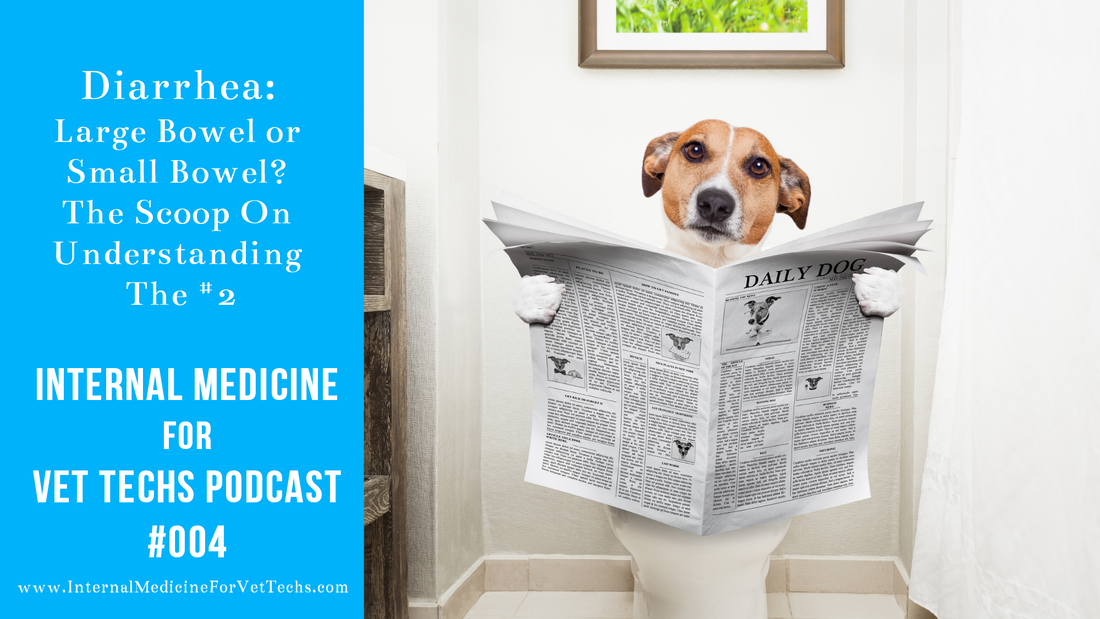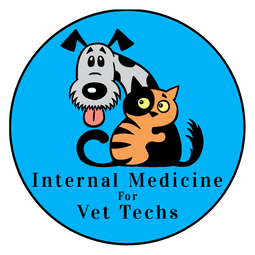|
In this episode we discuss poop. Yup, you read that right! Come on, we talk about this almost daily anyway, so you knew WE would talk about it too!
This week we discuss small bowel vs large bowel diarrhea, and how to tell what you are dealing with. Show Notes:
Join Yvonne Brandenburg, RVT, VTS SAIM and Jordan Porter RVT, LVT, VTS SAIM as we talk about:
Thanks so much for tuning in. Join us again next week for another episode! Listening Options
– Yvonne and Jordan Continuing Education Certificate
Want to earn some RACE approved CE credits for listening to the podcast? You can earn between 0.5-1.0 hour of RACE approved CE credit for each podcast episode you listen to.
Join the Internal Medicine For Vet Techs Membership to earn and keep track of your continuing education hours as you get your learn on! Join now! http://internalmedicineforvettechsmembership.com/ 004 Diarrhea: Large Bowel or Small Bowel? The Scoop On Understanding The #2 transcript powered by Sonix—the best audio to text transcription service004 Diarrhea: Large Bowel or Small Bowel? The Scoop On Understanding The #2 was automatically transcribed by Sonix with the latest audio-to-text algorithms. This transcript may contain errors. Sonix is the best way to convert your audio to text in 2019. Yvonne Brandenburg, RVT, VTS SAIM: Jordan Porter, RVT, LVT, VTS SAIM: Yvonne Brandenburg, RVT, VTS SAIM: Jordan Porter, RVT, LVT, VTS SAIM: Yvonne Brandenburg, RVT, VTS SAIM: Jordan Porter, RVT, LVT, VTS SAIM: Yvonne Brandenburg, RVT, VTS SAIM: Jordan Porter, RVT, LVT, VTS SAIM: Yvonne Brandenburg, RVT, VTS SAIM: Jordan Porter, RVT, LVT, VTS SAIM: Yvonne Brandenburg, RVT, VTS SAIM: Jordan Porter, RVT, LVT, VTS SAIM: Yvonne Brandenburg, RVT, VTS SAIM: Jordan Porter, RVT, LVT, VTS SAIM: Yvonne Brandenburg, RVT, VTS SAIM: Jordan Porter, RVT, LVT, VTS SAIM: Yvonne Brandenburg, RVT, VTS SAIM: Jordan Porter, RVT, LVT, VTS SAIM: Yvonne Brandenburg, RVT, VTS SAIM: Jordan Porter, RVT, LVT, VTS SAIM: Yvonne Brandenburg, RVT, VTS SAIM: Jordan Porter, RVT, LVT, VTS SAIM: Yvonne Brandenburg, RVT, VTS SAIM: Jordan Porter, RVT, LVT, VTS SAIM: Yvonne Brandenburg, RVT, VTS SAIM: Jordan Porter, RVT, LVT, VTS SAIM: Yvonne Brandenburg, RVT, VTS SAIM: Jordan Porter, RVT, LVT, VTS SAIM: Yvonne Brandenburg, RVT, VTS SAIM: Jordan Porter, RVT, LVT, VTS SAIM: Yvonne Brandenburg, RVT, VTS SAIM: Jordan Porter, RVT, LVT, VTS SAIM: Yvonne Brandenburg, RVT, VTS SAIM: Jordan Porter, RVT, LVT, VTS SAIM: Yvonne Brandenburg, RVT, VTS SAIM: Jordan Porter, RVT, LVT, VTS SAIM: Yvonne Brandenburg, RVT, VTS SAIM: Jordan Porter, RVT, LVT, VTS SAIM: Yvonne Brandenburg, RVT, VTS SAIM: Jordan Porter, RVT, LVT, VTS SAIM: Yvonne Brandenburg, RVT, VTS SAIM: Jordan Porter, RVT, LVT, VTS SAIM: Yvonne Brandenburg, RVT, VTS SAIM: Jordan Porter, RVT, LVT, VTS SAIM: Yvonne Brandenburg, RVT, VTS SAIM: Jordan Porter, RVT, LVT, VTS SAIM: Yvonne Brandenburg, RVT, VTS SAIM: Jordan Porter, RVT, LVT, VTS SAIM: Yvonne Brandenburg, RVT, VTS SAIM: Jordan Porter, RVT, LVT, VTS SAIM: Yvonne Brandenburg, RVT, VTS SAIM: Jordan Porter, RVT, LVT, VTS SAIM: Yvonne Brandenburg, RVT, VTS SAIM: Jordan Porter, RVT, LVT, VTS SAIM: Yvonne Brandenburg, RVT, VTS SAIM: Jordan Porter, RVT, LVT, VTS SAIM: Yvonne Brandenburg, RVT, VTS SAIM: Jordan Porter, RVT, LVT, VTS SAIM: Yvonne Brandenburg, RVT, VTS SAIM: Jordan Porter, RVT, LVT, VTS SAIM: Yvonne Brandenburg, RVT, VTS SAIM: Jordan Porter, RVT, LVT, VTS SAIM: Yvonne Brandenburg, RVT, VTS SAIM: Jordan Porter, RVT, LVT, VTS SAIM: Yvonne Brandenburg, RVT, VTS SAIM: Jordan Porter, RVT, LVT, VTS SAIM: Yvonne Brandenburg, RVT, VTS SAIM: Jordan Porter, RVT, LVT, VTS SAIM: Yvonne Brandenburg, RVT, VTS SAIM: Jordan Porter, RVT, LVT, VTS SAIM: Yvonne Brandenburg, RVT, VTS SAIM: Jordan Porter, RVT, LVT, VTS SAIM: Yvonne Brandenburg, RVT, VTS SAIM: Jordan Porter, RVT, LVT, VTS SAIM: Yvonne Brandenburg, RVT, VTS SAIM: Jordan Porter, RVT, LVT, VTS SAIM: Yvonne Brandenburg, RVT, VTS SAIM: Jordan Porter, RVT, LVT, VTS SAIM: Yvonne Brandenburg, RVT, VTS SAIM: Jordan Porter, RVT, LVT, VTS SAIM: Yvonne Brandenburg, RVT, VTS SAIM: Jordan Porter, RVT, LVT, VTS SAIM: Yvonne Brandenburg, RVT, VTS SAIM: Jordan Porter, RVT, LVT, VTS SAIM: Yvonne Brandenburg, RVT, VTS SAIM: Jordan Porter, RVT, LVT, VTS SAIM: Yvonne Brandenburg, RVT, VTS SAIM: Jordan Porter, RVT, LVT, VTS SAIM: Yvonne Brandenburg, RVT, VTS SAIM: Jordan Porter, RVT, LVT, VTS SAIM: Yvonne Brandenburg, RVT, VTS SAIM: Jordan Porter, RVT, LVT, VTS SAIM: Yvonne Brandenburg, RVT, VTS SAIM: Jordan Porter, RVT, LVT, VTS SAIM: Yvonne Brandenburg, RVT, VTS SAIM: Jordan Porter, RVT, LVT, VTS SAIM: Yvonne Brandenburg, RVT, VTS SAIM: Jordan Porter, RVT, LVT, VTS SAIM: Yvonne Brandenburg, RVT, VTS SAIM: Jordan Porter, RVT, LVT, VTS SAIM: Yvonne Brandenburg, RVT, VTS SAIM: Jordan Porter, RVT, LVT, VTS SAIM: Yvonne Brandenburg, RVT, VTS SAIM: Jordan Porter, RVT, LVT, VTS SAIM: Yvonne Brandenburg, RVT, VTS SAIM: Jordan Porter, RVT, LVT, VTS SAIM: Yvonne Brandenburg, RVT, VTS SAIM: Jordan Porter, RVT, LVT, VTS SAIM: Yvonne Brandenburg, RVT, VTS SAIM: Jordan Porter, RVT, LVT, VTS SAIM: Yvonne Brandenburg, RVT, VTS SAIM: Jordan Porter, RVT, LVT, VTS SAIM: Yvonne Brandenburg, RVT, VTS SAIM: Jordan Porter, RVT, LVT, VTS SAIM: Yvonne Brandenburg, RVT, VTS SAIM: Jordan Porter, RVT, LVT, VTS SAIM: Yvonne Brandenburg, RVT, VTS SAIM: Jordan Porter, RVT, LVT, VTS SAIM: Yvonne Brandenburg, RVT, VTS SAIM: Jordan Porter, RVT, LVT, VTS SAIM: Yvonne Brandenburg, RVT, VTS SAIM: Jordan Porter, RVT, LVT, VTS SAIM: Yvonne Brandenburg, RVT, VTS SAIM: Jordan Porter, RVT, LVT, VTS SAIM: Yvonne Brandenburg, RVT, VTS SAIM: Jordan Porter, RVT, LVT, VTS SAIM: Yvonne Brandenburg, RVT, VTS SAIM: Jordan Porter, RVT, LVT, VTS SAIM: Yvonne Brandenburg, RVT, VTS SAIM: Jordan Porter, RVT, LVT, VTS SAIM: Yvonne Brandenburg, RVT, VTS SAIM: Jordan Porter, RVT, LVT, VTS SAIM: Yvonne Brandenburg, RVT, VTS SAIM: Jordan Porter, RVT, LVT, VTS SAIM: Yvonne Brandenburg, RVT, VTS SAIM: Jordan Porter, RVT, LVT, VTS SAIM: Yvonne Brandenburg, RVT, VTS SAIM: Jordan Porter, RVT, LVT, VTS SAIM: Yvonne Brandenburg, RVT, VTS SAIM: Jordan Porter, RVT, LVT, VTS SAIM: Yeah. I was going to say SSD. Jordan Porter, RVT, LVT, VTS SAIM: Yvonne Brandenburg, RVT, VTS SAIM: Jordan Porter, RVT, LVT, VTS SAIM: Yvonne Brandenburg, RVT, VTS SAIM: Jordan Porter, RVT, LVT, VTS SAIM: Yvonne Brandenburg, RVT, VTS SAIM: Jordan Porter, RVT, LVT, VTS SAIM: Yvonne Brandenburg, RVT, VTS SAIM: Jordan Porter, RVT, LVT, VTS SAIM: Yvonne Brandenburg, RVT, VTS SAIM: Jordan Porter, RVT, LVT, VTS SAIM: Yvonne Brandenburg, RVT, VTS SAIM: Jordan Porter, RVT, LVT, VTS SAIM: Oh my god, I've not used this. But I saw this recently on Facebook. There was a vet tech group that they shared a picture of it. And I was like, what is this thing? But. I can see for the liquid diarrhea, that just projectile comes out the butt. Jordan Porter, RVT, LVT, VTS SAIM: Yvonne Brandenburg, RVT, VTS SAIM: Jordan Porter, RVT, LVT, VTS SAIM: Yvonne Brandenburg, RVT, VTS SAIM: Jordan Porter, RVT, LVT, VTS SAIM: Yvonne Brandenburg, RVT, VTS SAIM: Jordan Porter, RVT, LVT, VTS SAIM: Yvonne Brandenburg, RVT, VTS SAIM: Jordan Porter, RVT, LVT, VTS SAIM: Jordan Porter, RVT, LVT, VTS SAIM: Yvonne Brandenburg, RVT, VTS SAIM: Jordan Porter, RVT, LVT, VTS SAIM: Yvonne Brandenburg, RVT, VTS SAIM: Jordan Porter, RVT, LVT, VTS SAIM: Yvonne Brandenburg, RVT, VTS SAIM: Jordan Porter, RVT, LVT, VTS SAIM: Yvonne Brandenburg, RVT, VTS SAIM: Jordan Porter, RVT, LVT, VTS SAIM: Yvonne Brandenburg, RVT, VTS SAIM: Jordan Porter, RVT, LVT, VTS SAIM: Yvonne Brandenburg, RVT, VTS SAIM: Jordan Porter, RVT, LVT, VTS SAIM: Yvonne Brandenburg, RVT, VTS SAIM: Jordan Porter, RVT, LVT, VTS SAIM: Yvonne Brandenburg, RVT, VTS SAIM: Jordan Porter, RVT, LVT, VTS SAIM: Yvonne Brandenburg, RVT, VTS SAIM: Jordan Porter, RVT, LVT, VTS SAIM: Yvonne Brandenburg, RVT, VTS SAIM: Jordan Porter, RVT, LVT, VTS SAIM: Yvonne Brandenburg, RVT, VTS SAIM: Jordan Porter, RVT, LVT, VTS SAIM: Yvonne Brandenburg, RVT, VTS SAIM: Jordan Porter, RVT, LVT, VTS SAIM: Yvonne Brandenburg, RVT, VTS SAIM: Jordan Porter, RVT, LVT, VTS SAIM: Yvonne Brandenburg, RVT, VTS SAIM: Jordan Porter, RVT, LVT, VTS SAIM: Yvonne Brandenburg, RVT, VTS SAIM: Jordan Porter, RVT, LVT, VTS SAIM: Yvonne Brandenburg, RVT, VTS SAIM: Jordan Porter, RVT, LVT, VTS SAIM: Yvonne Brandenburg, RVT, VTS SAIM: Jordan Porter, RVT, LVT, VTS SAIM: With a tampon up their butt. Jordan Porter, RVT, LVT, VTS SAIM: Yvonne Brandenburg, RVT, VTS SAIM: Jordan Porter, RVT, LVT, VTS SAIM: Yvonne Brandenburg, RVT, VTS SAIM: Jordan Porter, RVT, LVT, VTS SAIM: Yvonne Brandenburg, RVT, VTS SAIM: Jordan Porter, RVT, LVT, VTS SAIM: Yvonne Brandenburg, RVT, VTS SAIM: Jordan Porter, RVT, LVT, VTS SAIM: Yvonne Brandenburg, RVT, VTS SAIM: Jordan Porter, RVT, LVT, VTS SAIM: Yvonne Brandenburg, RVT, VTS SAIM: Yes. VSL number three or something like that. Yeah. Oh, the capsules? Jordan Porter, RVT, LVT, VTS SAIM: Yvonne Brandenburg, RVT, VTS SAIM: Jordan Porter, RVT, LVT, VTS SAIM: Yvonne Brandenburg, RVT, VTS SAIM: Jordan Porter, RVT, LVT, VTS SAIM: Yvonne Brandenburg, RVT, VTS SAIM: Jordan Porter, RVT, LVT, VTS SAIM: Yvonne Brandenburg, RVT, VTS SAIM: Jordan Porter, RVT, LVT, VTS SAIM: Yvonne Brandenburg, RVT, VTS SAIM: Jordan Porter, RVT, LVT, VTS SAIM: Yvonne Brandenburg, RVT, VTS SAIM: Jordan Porter, RVT, LVT, VTS SAIM: Yvonne Brandenburg, RVT, VTS SAIM: Jordan Porter, RVT, LVT, VTS SAIM: Yvonne Brandenburg, RVT, VTS SAIM: Jordan Porter, RVT, LVT, VTS SAIM: Yvonne Brandenburg, RVT, VTS SAIM: Jordan Porter, RVT, LVT, VTS SAIM: Yvonne Brandenburg, RVT, VTS SAIM: Jordan Porter, RVT, LVT, VTS SAIM: Yvonne Brandenburg, RVT, VTS SAIM: Yvonne Brandenburg, RVT, VTS SAIM: Yvonne Brandenburg, RVT, VTS SAIM: Jordan Porter, RVT, LVT, VTS SAIM: Yvonne Brandenburg, RVT, VTS SAIM: Yvonne Brandenburg, RVT, VTS SAIM: Jordan Porter, RVT, LVT, VTS SAIM: Yvonne Brandenburg, RVT, VTS SAIM: Jordan Porter, RVT, LVT, VTS SAIM: Yvonne Brandenburg, RVT, VTS SAIM: Jordan Porter, RVT, LVT, VTS SAIM: Yvonne Brandenburg, RVT, VTS SAIM: Jordan Porter, RVT, LVT, VTS SAIM: Yvonne Brandenburg, RVT, VTS SAIM: Quickly and accurately convert audio to text with Sonix.Sonix uses cutting-edge artificial intelligence to convert your mp3 files to text. Thousands of researchers and podcasters use Sonix to automatically transcribe their audio files (*.mp3). Easily convert your mp3 file to text or docx to make your media content more accessible to listeners. Sonix is the best online audio transcription software in 2019—it's fast, easy, and affordable.If you are looking for a great way to convert your mp3 to text, try Sonix today.
5 Comments
Jessie Laguna
1/9/2020 04:19:17 am
Just an FYI in the show notes the link to the GI lab cobalamin page does not work.
Reply
Jordan A Porter
1/9/2020 07:32:29 am
Thank you for letting me know. This has been corrected.
Reply
Diana
6/14/2021 11:13:41 am
Hey! What type of barrier spray do you recommend? Thank you!
Reply
chelsea
12/8/2021 12:57:47 pm
What tablet did you all reference for colonoscopy prep?
Reply
Leave a Reply. |
Looking for a specific topic? Search below to get the right episode!
Sign Up for your password for the Technician Treasure Trove! Where to ListenArchives
June 2024
Categories
All
|
Visit www.InternalMedicineForPetParents.com to learn more about us

 RSS Feed
RSS Feed

